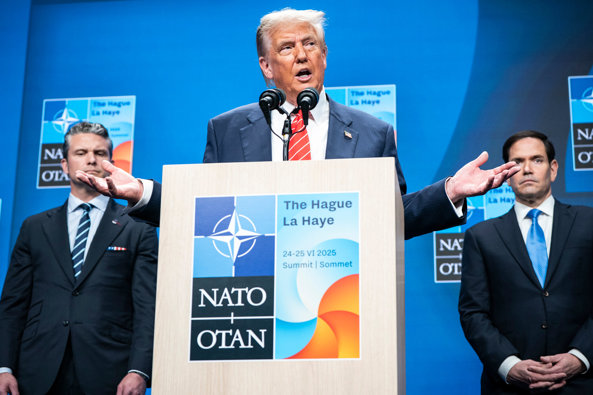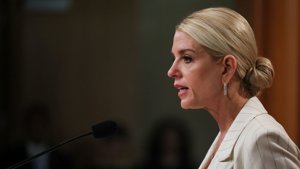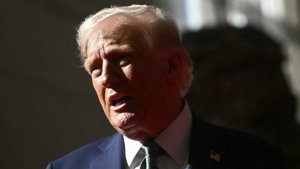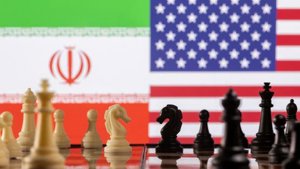
Trump: U.S. Will Strike Iran Again if Nuclear Program Rebuilt
Trump warns U.S. will strike Iran again if nuclear program is rebuilt, rebukes media criticism of mission’s impact.
Trump Issues Stark Warning at NATO Summit
President Donald Trump announced on Wednesday that the United States would strike Iran again if the country attempts to rebuild its nuclear program. Speaking during a NATO summit in the Netherlands, Trump responded bluntly to questions from reporters: “Sure,” he said when asked if he would authorize further action against Iranian nuclear facilities.
Trump’s comments came as the U.S. and its allies assessed the consequences of recent strikes on three of Iran’s nuclear sites. Israeli intelligence concluded that the U.S. operation had set Iran’s nuclear program back “many years,” a point Trump emphasized in his public remarks. NATO Secretary-General Mark Rutte praised Trump as both a “man of strength” and a “man of peace,” commending his role in brokering a ceasefire between Israel and Iran.
Media Scrutiny and Defense of U.S. Strikes
Trump and Defense Secretary Pete Hegseth forcefully defended the scope and success of the U.S. mission, targeting what they described as “fake news” reports from CNN and The New York Times. During a press conference at the summit, Trump read from a letter issued by Israel’s Atomic Energy Commission, asserting that the Fordow enrichment facility was rendered “totally inoperable.” He cited the Israeli assessment: “The American strikes on Iran’s nuclear facilities had set back Iran’s ability to develop nuclear weapons for many years to come. This achievement can continue indefinitely if Iran does not get access to nuclear material.”
Both Trump and Hegseth condemned media skepticism, accusing major outlets of undermining the U.S. military’s efforts and the credibility of the administration. “They were maligned and treated very bad, demeaned by fake news CNN,” Trump stated, adding that coverage suggesting the strikes were less effective had negatively affected U.S. pilots involved in the mission. Hegseth echoed this sentiment, warning that such reporting attempts to “spin” the news for political reasons and ignore the risk and courage shown by American personnel.
White House officials denounced the leaked intelligence cited by some media, calling it incomplete and an attempt to undermine the administration’s narrative. Press Secretary Karoline Leavitt and other officials described the leaks as efforts to discredit both the president and military personnel.
International Reaction and Future Consequences
NATO leaders offered mixed responses to the U.S. strikes, acknowledging the risk of a nuclear Iran but urging de-escalation in the region. The summit highlighted a shift in alliance dynamics, with Trump commended for securing increased defense spending commitments from member states. Rutte noted that all NATO countries except Spain had agreed to allocate 5% of GDP to defense, calling it a breakthrough achieved by Trump that “no American president in decades could get done.”
Trump concluded the summit with a warning to Iran: any effort to rebuild nuclear capabilities would result in renewed U.S. military action. “Iran’s nuclear enrichment facilities have been completely and totally obliterated,” he said, cautioning that future attacks would be “far greater and a lot easier” if Tehran resumed its nuclear ambitions.
As the ceasefire between Iran and Israel holds amid ongoing skepticism, Trump’s ultimatum signals the administration’s readiness to act decisively. The ongoing dispute over the success of the mission and media coverage ensures that debate over Iran’s nuclear program, U.S. foreign policy, and press responsibility will remain at the forefront of global attention.






